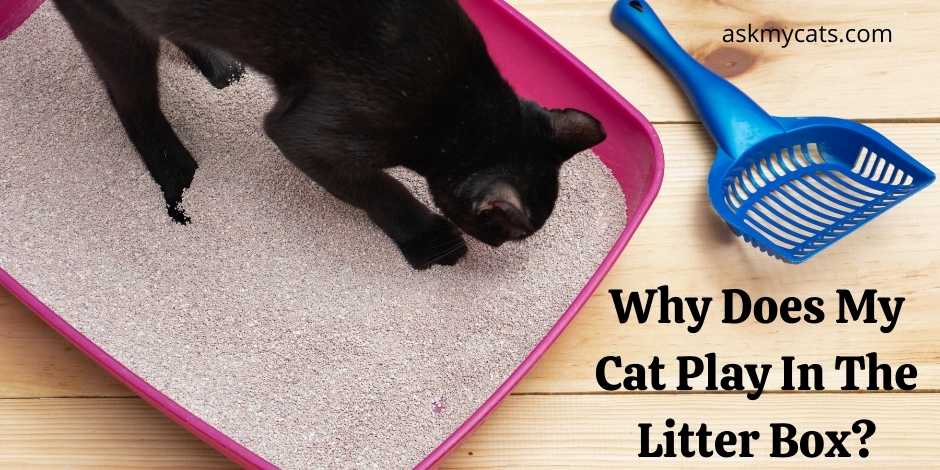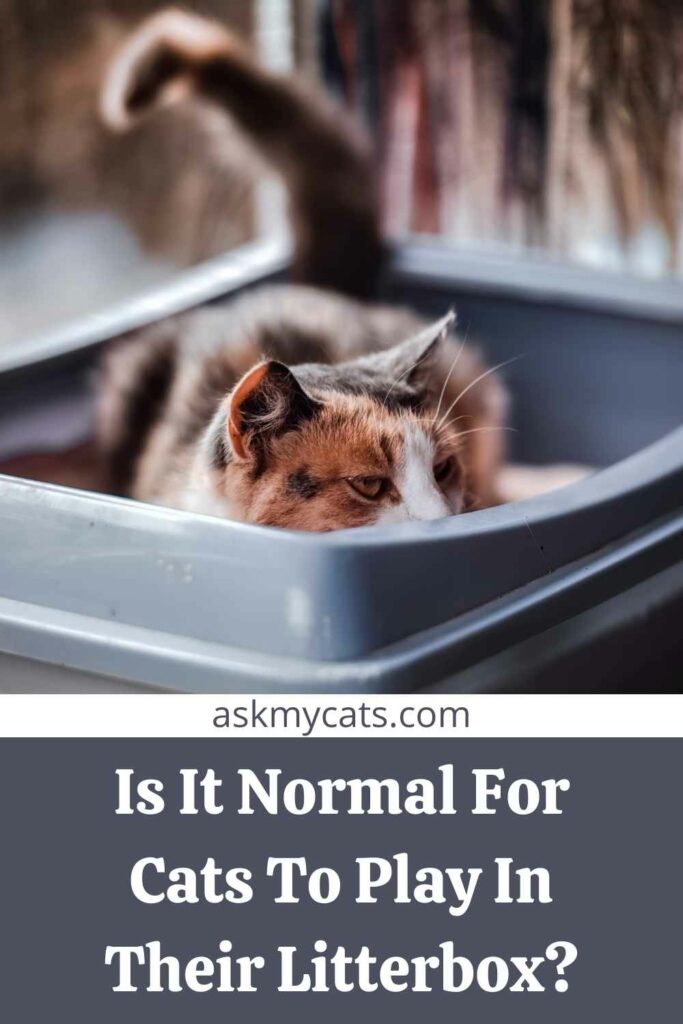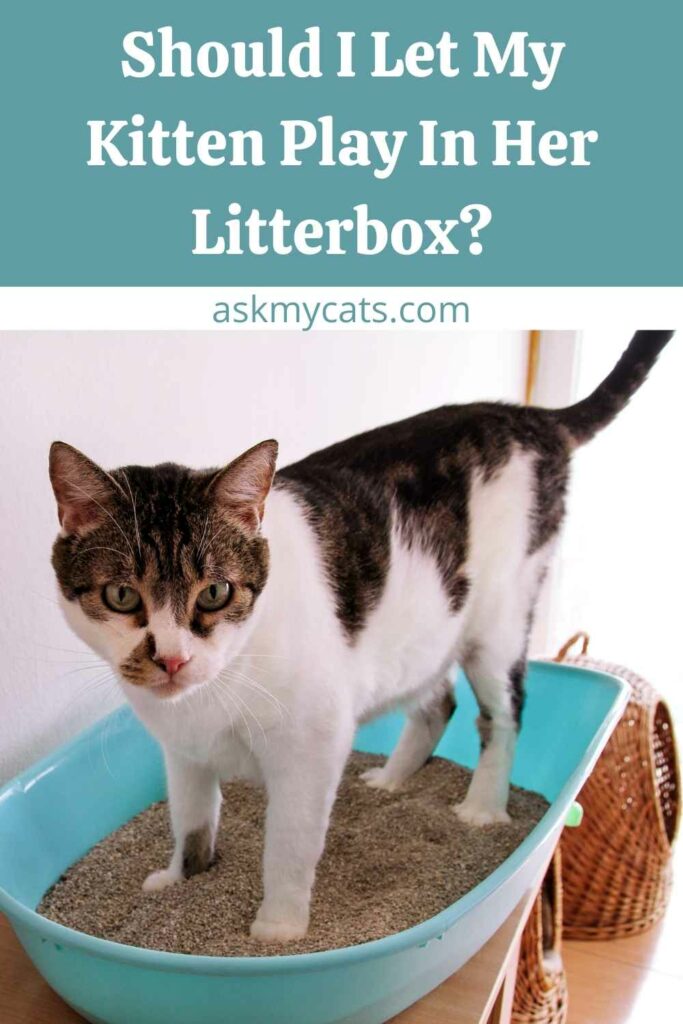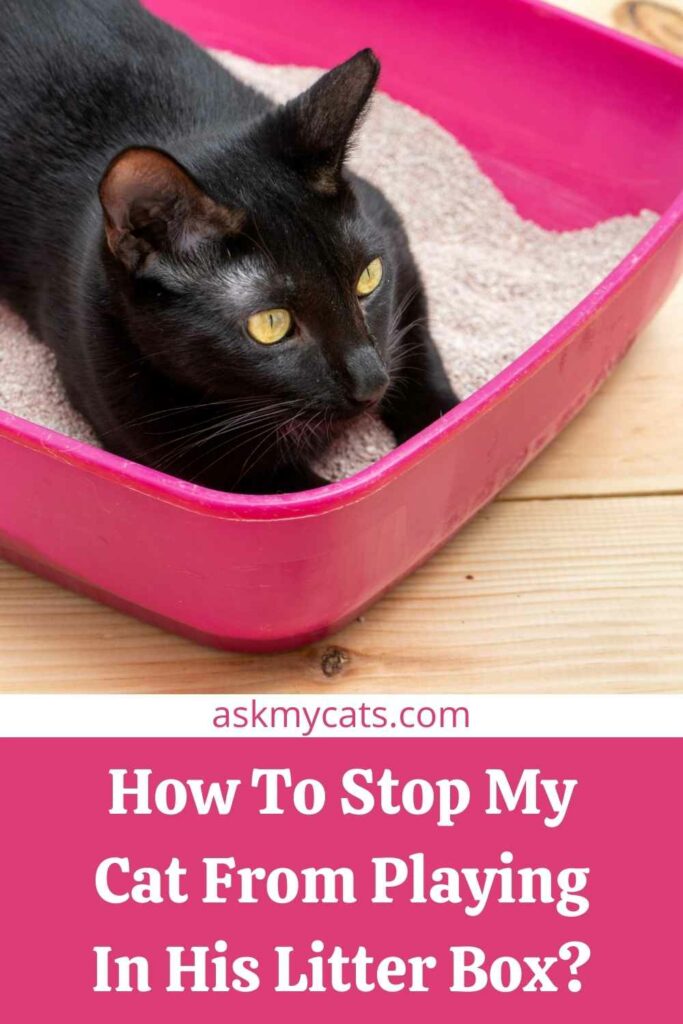Cats resting or even sleeping in their litter boxes are more prevalent than you may imagine, but it is typically an unwanted behavior.
Cats play in the litter box to satisfy their wild urges. Kittens are known for playing in the litter box. Jumping, scratching, and rolling around in the litter box are all acceptable forms of play. Litter box habits can sometimes be an indication of physical or mental issues.
It’s possible that your cat is bored if he’s playing in the litter box. In any event, allowing your cat to spend time in their litter box can make them unwell or uncomfortable, and it will most likely result in additional cat litter being dragged about the home, which will require cleaning.


Give Your Cat the Perfect Day
Get the Free Ebook!
Is It Normal For Cats To Play In Their Litterbox?
Yes, it is normal for cats to play in their litterbox when they get bored.

Boredom is to blame for a lot of cat behavior: It’s probably boredom if your cat goes across the counter, knocking everything off with their paw. It might be boredom if they assault your feet as you go by.
If they’re playing in the litter box, it’s likely they’ve grown tired of the catnip-infused toy mouse you brought home an hour ago. Provide them with a new toy or a new kitty post to be excited about.
Engage in conversation with them. When they have anything better to do, they are likely to abandon their urine-stained playpen.
Anxiety might force cats to retreat into their hiding places. Cats love to hide inside their litterboxes and peacefully play inside them.
If you’ve recently moved into a new home or adopted a new pet, dog, or child, this might be producing anxiety, which manifests as apprehensive behavior. Fireworks and storms are two more likely reasons.
Consider natural anti-anxiety remedies for cats, or ask your veterinarian to prescribe anti-anxiety medicine to assist your cat to adjust to the new situation.
In addition to generating stress, bringing a new cat or dog into the house may result in territorial disputes. If your cat is concerned that the new family member may try to take over the litter box, they may lay or even sleep in it to prevent the newcomer from using it.
In a perfect world, you’d have one litter tray for each cat in your home, plus one extra. This guarantees that all of your cats have access to a tray at all times. Consider installing another litter box if you don’t already have this many to avoid territorial disputes.
Moving to a new home is difficult for everyone, but you shouldn’t forget about the distress that it might give your feline companion.
After you move, your cat may only identify the litter tray as a source of stability in an ever-changing environment, rather than merely a place to pee and defecate.
Most cats will ultimately leave the litter tray on their own in this circumstance. It might take a few days, and it’s pretty guaranteed that the heavy lifting and loud noises won’t cease.
Even if you plan to buy everything new, put out a bed and blanket from your previous house. This will provide a reassuringly familiar home for your cat.
Alos, check out why does my cat scratch the floor after using the litter box
Should I Let My Kitten Play In Her Litterbox?
You shouldn’t make it a habit for your kitten to play in her litterbox. You can let her play in the litterbox once in a while.

Since cats are extremely finicky and notoriously meticulous about grooming, they have particular napping areas. So, if you discover your cat resting in his litter box, don’t be shocked.
A cat playing in litter-box regions might be entirely OK, or it could be a sign of a health problem.
It’s possible that your cat is playing in its litter box in an attempt to claim it as its own. If you have other pets in the house, your cat may get protective and try to keep them out of what they’ve determined is their territory.
Increasing the number of litter boxes in your home can make your cat feel more secure, reducing the urge for your feline to mark their territory.
If you’ve just brought a new pet into the house, keeping that critter isolated from your cat for a more gradual introduction may also be beneficial.
Some cats may find the litter box relaxing, especially if you’ve just switched to a different sort of litter. Your cat may be bewildered by the different textures and scents in his litter box, and a soft litter, such as recycled paper, may be more comfortable and the ideal area for a nap.
Make any litter modifications gradually to prevent this problem. Begin by adding 1/4 of your new litter to the box, and then gradually increase the amount of new litter while decreasing the amount of old litter.
Your cat will take some time to become accustomed to the new litter and will have the opportunity to link it with the spot where they will perform their business rather than just play.
You might also like to know reason behind cat dragging poop out litter box
Why Does My Cat Play In The Litterbox?
Your cat plays in the litterbox just to get rid of his boredom and enjoy his good time.
We’ve discussed some of the reasons why your cat could be playing in the litter box, as well as some actions you can take to stop it.
1. Frightened Kitty
Changes in routine can cause anxiety in cats. A kitty’s heart might race in response to loud noises or strangers. They regard their litter box as a safe haven and may seek refuge there.
If a cat’s home is suddenly threatened, it can retreat to its litter box, which may feel like the only thing that belongs to them and is likely a location where it won’t be harassed.
Sitting in the litter box also encourages a cat’s smell glands to remain in the area, which is another method for them to claim the box as their own.
2. Medical Issues
Urinary issues and disorders in cats can influence their capacity to relieve themselves. Let’s say your cat is attempting to pee but failing.
It might be an indication of a urinary tract infection, kidney stones, or Feline Interstitial Cystitis in such a situation. The capacity of a cat to eliminate can be harmed by this neurological disorder.
Something may be causing your cat to itch if he or she is rolling. This might be a symptom of dermatitis or a more serious condition.
If you see these behaviors, especially if they are accompanied by unexpected mood swings or meows, you should contact your veterinarian as soon as possible.
3. Dirty Cat
It’s possible that rolling and playing about in a clean litter box is a re-creation of a wild cat’s washing routine. Outdoor cats roll in the dirt to get rid of the top layer of excess hair and germs that irritate them and make them feel unclean.
Cats roll in the litter box to dust bathe when they don’t have access to the outdoors. Many mammals get filthy in order to feel clean, which may seem paradoxical.
You might also like to read about why does my cat play with his poop
Why Does My Cat Go Crazy In The Litterbox?
Cats go crazy in the litterbox because they get zoomies after using the litterbox.
After using the litter box, many cats appear to do a victory lap. Some cats may rush around like crazy after having a bowel movement, especially if it was unpleasant.
Infections or inflammatory processes involving the urinary system, colon, or rectum may cause pain. It might possibly be the result of constipation.
If your veterinarian eliminates medical causes for your cat’s post-bathroom running, you may assume it’s simply your cat’s way of applauding a job well done.
You might also like to know reasons for cat digging in litter box
Why Does My Cat Spend So Much Time In The Litterbox?
If your cat is spending too much time in the litterbox, then he is facing some serious health issues like urethral obstruction.
The term “blocked” is used to describe this ailment, which affects mostly men. When material (typically mucus and crystals) collects in the bladder and binds together to create a plug, it is called a urethral obstruction.
This blockage becomes stuck in the urethra (the tube that drains pee from the bladder) and prevents the cat from passing urine. This begins as an unpleasant situation in which the cat is unable to generate pee in the litter box.
A urethral blockage will proceed to a life-threatening emergency and death if not treated. After your vet has treated you, he or she will most likely prescribe a prescription diet to minimize crystal development and advise ways to drink more water.
Every 24-36 hours, the average cat defecates at least once. The bowel movement of a healthy cat should be well-formed and wet enough for litter to adhere to it. Your cat may be constipated if you notice little chunks of dry feces or stool fewer than once per 36 hours.
Constipated cats may also strain in the litter box and vomit as a result of the straining. Constipation in cats is frequent, and it can be simple or a sign of a more serious issue.
It is preferable to get your cat examined by a veterinarian. If the condition is minor, your veterinarian may suggest some home treatments.
Check out the reasons for cat sitting in litter box doing nothing
How To Stop My Cat From Playing In His Litter Box?
You should make sure that your cat has enough number of litterboxes or else he would be playing in them.

The usual guideline is that each cat should have one box plus one extra box. It is, however, dependent on your cats. Some cats like to have only one box in one location, while others prefer to wander and have a variety of possibilities.
The more boxes you have, though, the more your cat will feel like they have their own distinct domain. If you have numerous cats, having multiple sites for them to do their business will help you prevent squabbles.
A litter box with a cover may give a little extra privacy. It will be less comfortable to use a self-cleaning litter box. And a smaller, shallower pan won’t give them the same feeling of safety.
If your cat is flinging litter around, digging excessively, or clawing the box’s sides, it’s time to scrape it out and replace it with new litter. The best ways to ensure that the pan is quick and easy to clean and scoop are to use clumping litter or an auto-cleaning litter box.
A pan with less trash will be less pleasurable to roll in and will have less to rummage through. It will, however, require more frequent cleaning.
Also, read the reasons for cat keeps going to litter box but nothing happens
It’s possible that the issue isn’t with the litter box at all if your cat uses it to hide or is territorial. Let’s pretend there’s been a shift or a snag in their routine.
In such instances, your kitten could just be signaling that they need a little more affection and time to adjust, especially if the litter box issues are accompanied by other strange behaviors.
Make sure you’re spending time with your cat, whether it’s playing, snuggling, talking to them, or simply being close, if things are new or even briefly out of the norm. You know more about your cat than anybody else.
If the issue appears to be emotional, pay them additional attention for a while. Take your cat to the doctor or a cat behavioral specialist if the problem persists and your cat appears worried or distressed.
Cats regard their litter box as a sacred place, and it might be a sign of mental or physical distress. Litter box behavior is crucial to monitor since it may disclose something you didn’t realize. So pay attention as much as you can, even if it means holding your nose!
Also, find out why does my cat scratch the side of the litter box
Frequently Asked Questions
Do cats outgrow their litter box?
Cats might outgrow their litter box and refuse to perform their business in an area that is too tiny for them to feel at ease.
Why does my cat scratch the floor after using the litter box?
Cats who scratch the floor or the wall after using the litter box are typically expressing a statement about the litter box or the litter. If the litter box isn’t clean enough, cats may indulge in this habit. The cat litter should be around 3 inches deep in the ideal situation.
Why does my cat keep going to the litter box but nothing happens?
You might be dealing with something more than a urinary issue if your cat keeps going to the litter box but nothing happens. Instead, your cat can be suffering from persistent constipation. Constipation is more common in middle-aged to geriatric cats (eight years or older).
Final Words
It is common for littermates to follow each other into the box and transform toilet time into playing, which is especially prevalent with kittens. This can sometimes last until adulthood, especially among siblings. Adult cats, too, like playing in the litter box.
Leave your questions in the comments section below.
Interesting Read: Why Is My Cat Sleeping Next To A Litter Box?
